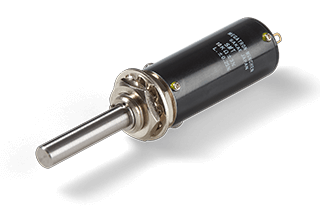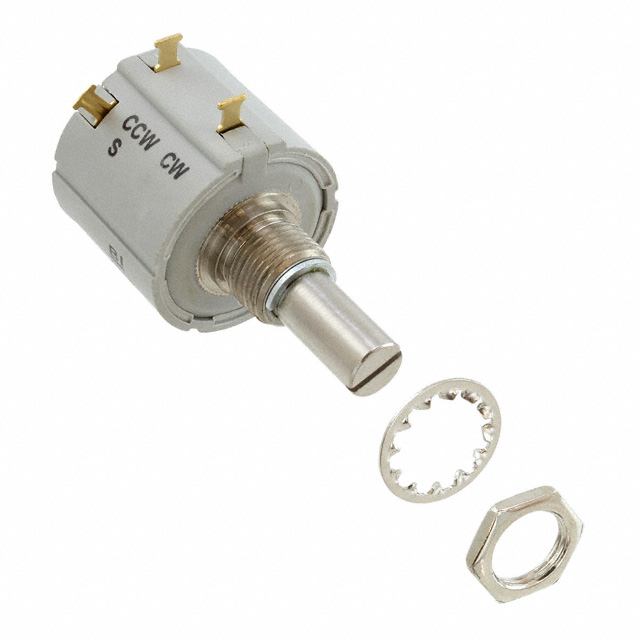In electronic components, the right tools can make all the difference. Among these, potentiometers play a pivotal role in controlling device functionalities. However, not all potentiometers are created equal, and Single Turn Potentiometers excel in their simplicity and efficiency.
This blog aims to explore these components in-depth, providing a clear understanding of their importance in electronic controls.
What are Single Turn Potentiometers?

At its core, a single-turn potentiometer is a type of variable resistor. It is designed to complete its entire electrical range of adjustment with just one revolution of its shaft. This characteristic sets it apart from multi-turn potentiometers, which need multiple rotations for a full range.
Single Turn Potentiometers are all about precision and ease of use. They are fundamental in circuits where voltage, resistance, or current adjustments must be made swiftly and accurately. They provide a straightforward solution for complex adjustments, making them indispensable in various applications.
Applications of Single Turn Potentiometers
Single Turn Potentiometers find their way into an extensive range of industries. They are key in fine-tuning sound levels and balances in the audio world. Their precision is important in industrial settings, especially in motor control applications, where speed adjustments must be exact. Diagnostic devices and patient monitoring systems in medicine rely on these potentiometers for accurate calibrations.
Moreover, in the automotive sector, they are used for sensor adjustments and fine-tuning electronic components. Even in everyday consumer electronics, these potentiometers play a role in controlling various functionalities. The versatility of Single Turn Potentiometers is a testament to their adaptability and effectiveness in different environments.
Benefits of Using Single Turn Potentiometers
The advantages of Single Turn Potentiometers are multifaceted. Their simple design ensures reliability and a longer lifespan due to fewer moving parts. This simplicity also translates to higher precision, critical in applications where accuracy is paramount.
Another significant benefit is cost-effectiveness. Despite their high functionality, Single Turn Potentiometers are economical, making them ideal for projects with budget constraints. They also come in various sizes and resistance values, offering flexibility for various applications.
Furthermore, these potentiometers are known for their durability. They are designed to withstand various environmental conditions, making them suitable for rugged industrial settings. Their robust construction means they can handle regular adjustments without compromising on performance.
Key Considerations When Choosing Single-Turn Potentiometers

Selecting the right Single Turn Potentiometer involves several considerations.
- First, the resistance value must match the specific needs of your application. The size and physical configuration are equally important, ensuring that the potentiometer fits into the designated space in your device.
- Durability is another critical factor, especially for applications in challenging environments. It’s essential to choose potentiometers that can withstand the conditions they will be exposed to, whether high temperatures, moisture, or mechanical stress.
The Best Products We Offer
Key Takeaways
Single Turn Potentiometers are a cornerstone in the realm of electronic controls. Their straightforward design and operational simplicity make them invaluable in various applications, from industrial machinery to consumer electronics. These components offer precise control, enhancing the functionality and reliability of integrated devices.
By balancing cost-effectiveness with high performance, Single Turn Potentiometers simplify control mechanisms and open doors to innovation and efficiency in electronics. For anyone looking to streamline their electronic control solutions, these potentiometers stand out as an optimal choice.
Explore Our Range Now and transform your approach to electronic controls with ETI Systems.

bataraslot: batara88 – bataraslot alternatif
EverGreenRx USA: EverGreenRx USA – tadalafil citrate liquid
when is generic cialis available EverGreenRx USA what does generic cialis look like
http://evergreenrxusas.com/# price of cialis at walmart
when does the cialis patent expire india pharmacy cialis
https://images.google.ro/url?sa=t&url=https://evergreenrxusas.com is tadalafil from india safe
tadalafil lowest price is there a generic cialis available in the us
cialis what age: cialis delivery held at customs – cialis 80 mg dosage
canadian pharmacy ezzz cialis cialis canada
https://www.wescomfinancial.com/info/redirect.aspx?name=myterm&url=http://intimapharmafrance.com/ tadalafil (tadalis-ajanta)
when will teva’s generic tadalafil be available in pharmacies buy cialis united states
EverGreenRx USA: EverGreenRx USA – EverGreenRx USA
EverGreenRx USA EverGreenRx USA cialis interactions
https://evergreenrxusas.shop/# max dosage of cialis
https://evergreenrxusas.com/# EverGreenRx USA
oryginal cialis tadacip tadalafil
https://cse.google.com.cu/url?sa=t&url=https://evergreenrxusas.shop taking cialis
cialis mit paypal bezahlen what is cialis pill
cheap cialis canada: cialis contraindications – EverGreenRx USA
buy cialis canadian order cialis canada
http://www.esquiremediakit.com/r5/emaillink.asp?link=https://evergreenrxusas.shop:: tadalafil buy online canada
cialis precio side effects cialis
https://evergreenrxusas.shop/# over the counter cialis 2017
where to buy generic cialis: active ingredient in cialis – cialis contraindications
maximpeptide tadalafil review cost of cialis for daily use
https://soccer.sincsports.com/ttlogin.aspx?tid=german&dfix=y&domain=pharmalibrefrance.com cialis cost per pill
vardenafil tadalafil sildenafil purchasing cialis online
stromectol pills home delivery UK MediTrustUK MediTrustUK
http://mediquickuk.com/# pharmacy online fast delivery UK
https://intimacareuk.shop/# cialis online UK no prescription
order viagra online safely UK https://bluepilluk.shop/# BluePill UK
MediTrustUK generic stromectol UK delivery stromectol pills home delivery UK
http://intimacareuk.com/# IntimaCare
sildenafil tablets online order UK https://intimacareuk.com/# cialis online UK no prescription
IntimaCare UK IntimaCare cialis cheap price UK delivery
http://intimacareuk.com/# cialis cheap price UK delivery
https://bluepilluk.com/# viagra online UK no prescription
generic sildenafil UK pharmacy https://mediquickuk.com/# confidential delivery pharmacy UK
viagra online UK no prescription viagra online UK no prescription or BluePillUK viagra discreet delivery UK
http://jpn1.fukugan.com/rssimg/cushion.php?url=bluepharmafrance.com&popup=1 BluePillUK or http://www.psicologiasaludable.es/user/lsyxzdnrcx/ BluePill UK
viagra discreet delivery UK sildenafil tablets online order UK or BluePillUK fast delivery viagra UK online
MediQuickUK cheap UK online pharmacy and UK pharmacy home delivery UK pharmacy home delivery
https://www.clickcritters.com/external_page.php?url=https://mediquickuk.com pharmacy online fast delivery UK or https://501tracking.com/user/evdohrqird/?um_action=edit trusted UK digital pharmacy
confidential delivery pharmacy UK online pharmacy UK no prescription and generic and branded medications UK trusted UK digital pharmacy
viagra online UK no prescription viagra discreet delivery UK fast delivery viagra UK online
BluePillUK http://bluepilluk.com/# order viagra online safely UK
cheap UK online pharmacy: MediQuick – confidential delivery pharmacy UK
ivermectin without prescription UK MediTrustUK stromectol pills home delivery UK
http://meditrustuk.com/# MediTrust UK
https://bluepilluk.com/# fast delivery viagra UK online
buy ED pills online discreetly UK IntimaCare and tadalafil generic alternative UK cialis cheap price UK delivery
https://www.procolleges.com/college_search/go.php?url=http://intimapharmafrance.com buy ED pills online discreetly UK and https://an-gesehen.de/user/uefmnmpvhn/ branded and generic tadalafil UK pharmacy
IntimaCare weekend pill UK online pharmacy and tadalafil generic alternative UK confidential delivery cialis UK
order viagra online safely UK http://bluepilluk.com/# viagra online UK no prescription
sildenafil tablets online order UK order viagra online safely UK or BluePill UK fast delivery viagra UK online
http://images.google.ad/url?q=https://bluepilluk.com viagra online UK no prescription or https://www.9tj.net/home.php?mod=space&uid=422558 BluePill UK
order viagra online safely UK fast delivery viagra UK online or generic sildenafil UK pharmacy fast delivery viagra UK online
UK pharmacy home delivery generic and branded medications UK and confidential delivery pharmacy UK confidential delivery pharmacy UK
https://images.google.fi/url?q=https://mediquickuk.com MediQuick UK or https://www.news-adhoc.com/author/sirmnvhetm/ pharmacy online fast delivery UK
MediQuickUK confidential delivery pharmacy UK and trusted UK digital pharmacy MediQuick
stromectol pills home delivery UK generic stromectol UK delivery stromectol pills home delivery UK
BluePill UK https://meditrustuk.com/# generic stromectol UK delivery
generic stromectol UK delivery generic stromectol UK delivery MediTrust
https://bluepilluk.shop/# generic sildenafil UK pharmacy
online pharmacy UK no prescription pharmacy online fast delivery UK and MediQuickUK online pharmacy UK no prescription
https://usachannel.info/amankowww/url.php?url=https://mediquickuk.com generic and branded medications UK or https://www.packadvisory.com/user/wjhablshha/ UK pharmacy home delivery
MediQuick UK trusted UK digital pharmacy and confidential delivery pharmacy UK pharmacy online fast delivery UK
viagra online UK no prescription viagra online UK no prescription sildenafil tablets online order UK
buy ED pills online discreetly UK: confidential delivery cialis UK – confidential delivery cialis UK
IntimaCare IntimaCareUK weekend pill UK online pharmacy
safe ivermectin pharmacy UK: generic stromectol UK delivery – stromectol pills home delivery UK
https://intimacareuk.shop/# weekend pill UK online pharmacy
order medicines online discreetly cheap UK online pharmacy and MediQuick UK UK pharmacy home delivery
http://drumsk.ru/bitrix/redirect.php?event1=&event2=&event3=&goto=https://mediquickuk.com/ MediQuickUK or https://vintage-car.eu/user/zfxggkxpkf/ order medicines online discreetly
cheap UK online pharmacy UK pharmacy home delivery or UK pharmacy home delivery pharmacy online fast delivery UK
TrueNorth Pharm TrueNorth Pharm TrueNorth Pharm
CuraBharat USA: CuraBharat USA – online medicine india
https://truenorthpharm.com/# TrueNorth Pharm
is mexipharmacy legit: SaludFrontera – SaludFrontera
canadian compounding pharmacy canadian pharmacy no rx needed canadian pharmacy 1 internet online drugstore
https://truenorthpharm.com/# TrueNorth Pharm
CuraBharat USA: pharmacy website – CuraBharat USA
https://saludfrontera.shop/# SaludFrontera
online pharmacies: mexican pharmacy online – buying prescription drugs in mexico
canada pharmacy world canada pharmacy or canadian pharmacies compare global pharmacy canada
https://maps.google.com.mt/url?rct=j&sa=t&source=web&url=https://truenorthpharm.com canada pharmacy online or https://www.news-adhoc.com/author/xvpxhphifi/ canadian compounding pharmacy
canadian online pharmacy canadian pharmacy prices or my canadian pharmacy review canadian pharmacy
buy medicine online order medicines from india to usa or pharmacy website pharmacy online medicine
http://redirect.wooptydoo.com/?r=http://intimapharmafrance.com online medicine site or http://asresin.cn/home.php?mod=space&uid=57941 medicine online order
india ki pharmacy medicine from india and online pharmacy india online medicine india
TrueNorth Pharm TrueNorth Pharm TrueNorth Pharm
pharmacy in mexico that ships to us mexico pet pharmacy and purple pharmacy farmacia mexicana en chicago
https://www.google.gy/url?q=https://saludfrontera.com progreso mexico pharmacy online or https://hiresine.com/user/emyvgwvlox/?um_action=edit pharmacy mexico
online pharmacies mexican mail order pharmacy and hydrocodone mexico pharmacy mexico pharmacy
mexico pharmacy list: worldwide pharmacy – online pharmacies
https://truenorthpharm.shop/# TrueNorth Pharm
TrueNorth Pharm: canadian online pharmacy reviews – TrueNorth Pharm
pharmacy mexico pharmacy in mexico that ships to us mexican online pharmacy wegovy